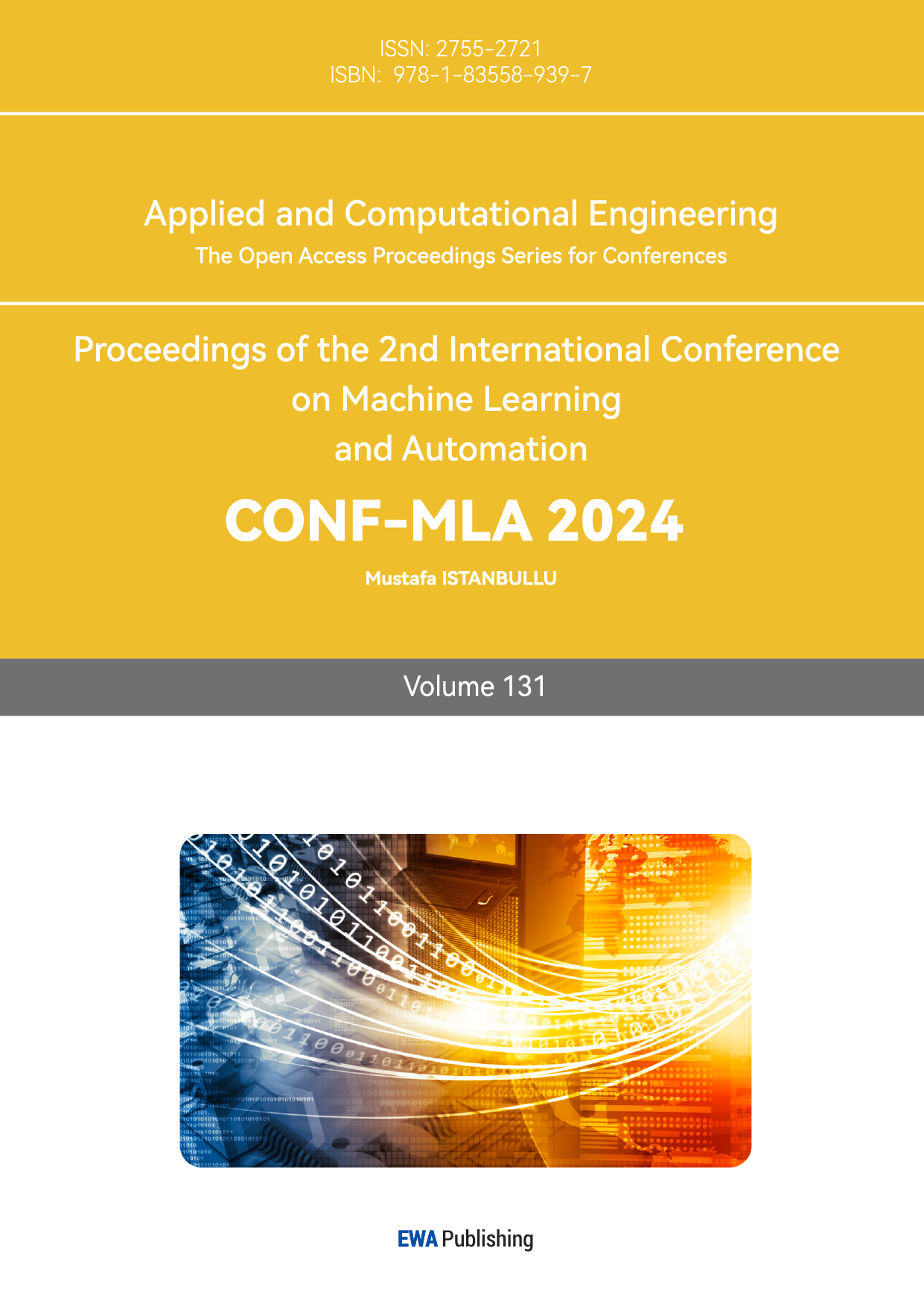1. Introduction
1.1. Background Intro
In modern education, fostering students' reading habits and providing them with suitable reading materials are critical to academic development. Personalized book recommendations based on individual students' subjects and grade levels can greatly enhance learning experiences.[1] With the advent of AI technologies like ChatGPT, it is now possible to create intelligent systems that can offer personalized, context-aware book recommendations.[2-3] This paper investigates existing literature review about the book recommendation system and the future direction for personalized educational tools.
1.2. Application Intro
Book recommendation systems tend to provide personalized book recommendation services for users, which can be provided by analyzing historical data or referencing users' learning tendencies. Traditional book recommendation systems are highly reliant on content-based recommendation algorithms or collaborative filtering algorithms.[4] The performance of recommendations is often affected by length procedure or complex investigation, which limits the further improvement of these methods.[5] With the integration of artificial intelligence models, book recommendation systems are exploring the outstanding capabilities of these models, aiming to deepen communication with users to understand user needs more accurately and provide more personalized recommendation solutions.
1.3. Our Goal
The goal of our project is to create a personalized book recommendation system that effectively supports students in their learning journey by providing study materials tailored to their specific grade level, subjects, and preferences. We aim to build a user-friendly and adaptive platform that offers relevant and meaningful recommendations, helping students discover books that match their educational needs and interests. By integrating user feedback, such as "Like" and "Dislike" options, and leveraging data-driven personalization, our goal is to enhance the overall learning experience, making it more intuitive, engaging, and impactful for students.
2. Iternation1
2.1. Finding
Under the help of Human-Computer Interaction (HCI), particularly with the advent of big data, creating intuitive and effective book recommendation systems seems easy to achieve. However, many problems remain in the real book recommendation system so we conducted a comprehensive survey to investigate their needs , pain points, and so on.
2.1.1. User Needs
Personalization: Users incline to the book customized to their reading habit but don’t know how to describe them.
Ease of Use: The system should be user-friendly, with a simple and intuitive interface that allows for easy navigation and book discovery.
Relevance: Recommended books should be highly relevant to the user's interests and reading patterns.
2.1.2. Pain Points
Irrelevant Recommendations: Sometimes the topic was too wide but not the certain aspect users wanted
Complexity: Some users found the procedure overly complex, with too many features and options that overwhelmed them.
Lack of Explanations: Users often felt that recommendations were arbitrary and lacked explanations for why a particular book was suggested, then they may tend to ignore the readding suggestion.
2.1.3. Status Quo
Existing Systems: Most existing book recommendation systems rely on collaborative filtering, content-based filtering, or hybrid approaches that combine both.
User Feedback: While many systems allow for user feedback, this feedback is not always incorporated effectively into the recommendation algorithm.
Integration with Other Platforms: Sometimes one platform don’t integrate with other platform to generate more specific information
2.2. Survey Design
To gain insight into the current practices and better understand user needs, we designed an online questionnaire consisting of 10 questions. This survey was distributed to 65 students across different grades in our school, specifically targeting junior and senior high school students.
As part of the survey, students were asked, "What is the biggest challenge you face when selecting study books for different subjects?" This question aims to identify the primary difficulties students encounter when choosing appropriate books, allowing us to design features that cater directly to their needs. When it turned to 7th question, we asked, "Do you prefer book recommendations that are strictly based on your current subjects or those that explore other interesting topics?" We tried to obtain their preference about the system—whether they value purely subject-specific suggestions or a mix that introduces new topics to explore.
Through these questionnaires, we comprehended the challenges they met when they chose books online. And we attempted to create a more succinct but precise book recommended system.
2.3. Participants
We recruited 65 participants through various channels, including university libraries, online friends who are undergraduate.
2.4. Summary of the Findings from the Survey
2.4.1. User Preferences
A significant majority of users (81.5%) preferred personalized recommendations based on their reading history and preferences.
Users valued ease of use and a clean, intuitive interface over complex features and options.
2.4.2. Pain Points
Irrelevant recommendations were the most frequent complaint, cited by 64.6% of respondents.
Complexity and overwhelming features were mentioned by 44.6% of users as reasons for dissatisfaction.
2.4.3. Desired Features
Users wanted more explanations for why a particular book was recommended (80%).
Integration with social media for book discovery and sharing was highly desired (75.4%).
Options for customizing recommendations based on specific criteria (e.g., genre, author, publication date) were sought by 64.6% of respondents.
3. Iteration 2: Low-Fidelity Prototype Testing and Initial Improvements
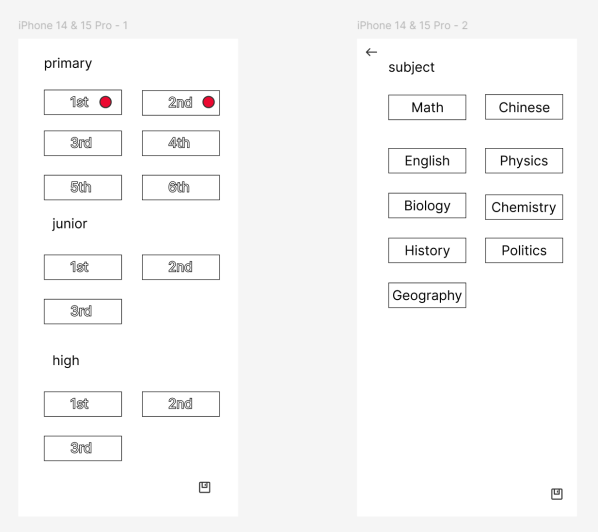
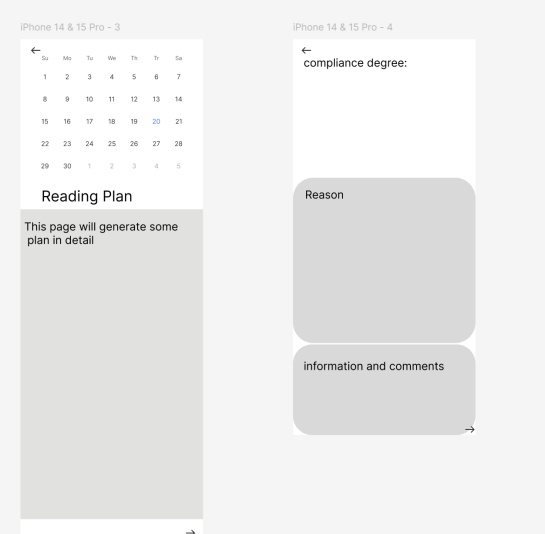 Figure 1. our low-fi prototype
Figure 1. our low-fi prototype
In the second iteration, our primary focus was on identifying user needs, designing a low-fidelity prototype, and involving potential users in the design process to guide future development. This phase involved defining the core functionalities of the system and gaining insights into the expectations and requirements of students regarding book recommendations tailored to their educational needs.
3.1. Low-Fi Prototype Overview
The prototype included four key screens:
1. Grade Selection: Users selected their grade level (primary, junior, or senior high).
2. Subject Selection: Users chose the subjects they were interested in, such as Math, Physics, or Chinese.
3. Reading Plan: Displayed a calendar-based reading plan, generated according to the subjects selected.
4. Feedback Screen: Allowed users to evaluate the recommendations using a "compliance degree" slider and provide comments.
3.2. Participants
Three students with different academic backgrounds were selected to participate in the evaluation. The participants were junior high and high school students, as their experiences and needs are closely aligned with the intended target audience for the application.
3.3. Procedure
Participants interacted with the prototype screens in a guided session led by our research team. Each participant walked through the entire flow, starting with grade selection, followed by subject selection, viewing a generated reading plan, and finally, providing feedback on book recommendations.
Participants were asked to articulate their thoughts while using each screen. They provided insights into what they found useful, what was unclear, and what could be improved.
3.4. Results: Key System Designs
Through the evaluations of their experience using the low-fidelity prototype, participants provided the following insights that informed the design of our book recommendation system:
#1 Simplified Navigation for Grade and Subject Selection
Two participants mentioned that navigating between multiple pages to select the grade and subjects was inconvenient. The process involved multiple steps, which sometimes led to confusion.
Design Improvement: We merged the grade and subject selection into a single page, as shown in our low-fidelity prototype. Users can now easily select both options without switching pages, simplifying the initial steps of interaction.
#2 Improved Personalization with Book Selection Feedback
Because the basic pages just provide grades and subjects that they can choose, all three participants are concerned that the tailored degree is low. The recommended books don’t always meet their demands.
Design Improvement: We create a page that generates 5 books offered to users to click like or dislike. The results will be input as a prompt so ai can know users’ needs more clearly and the procedure won’t be too lengthy.
#3 Decrease the complexity of results
When there are too many books recommended to users, they don’t have time to read them all, so they must choose randomly, which leads to users’ annoyance.
Design Improvement: We just recommend a book at a time considering the grade, subject, like and dislike so they can read a book and have one more at next time.
4. Iteration 3: High-Fidelity Prototype Development and Evaluation
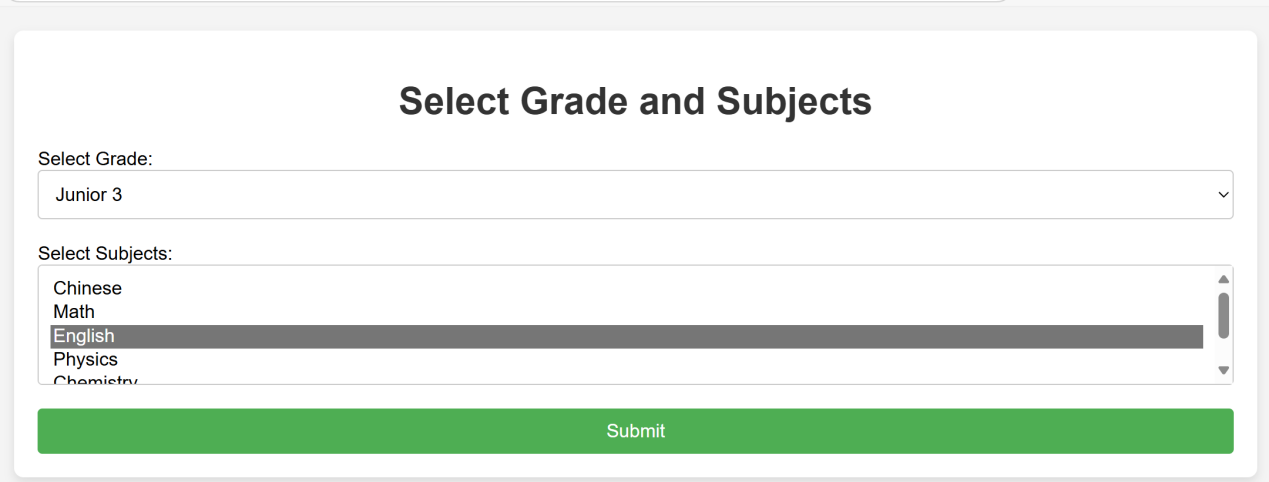
Figure 2. grade and subject selection page
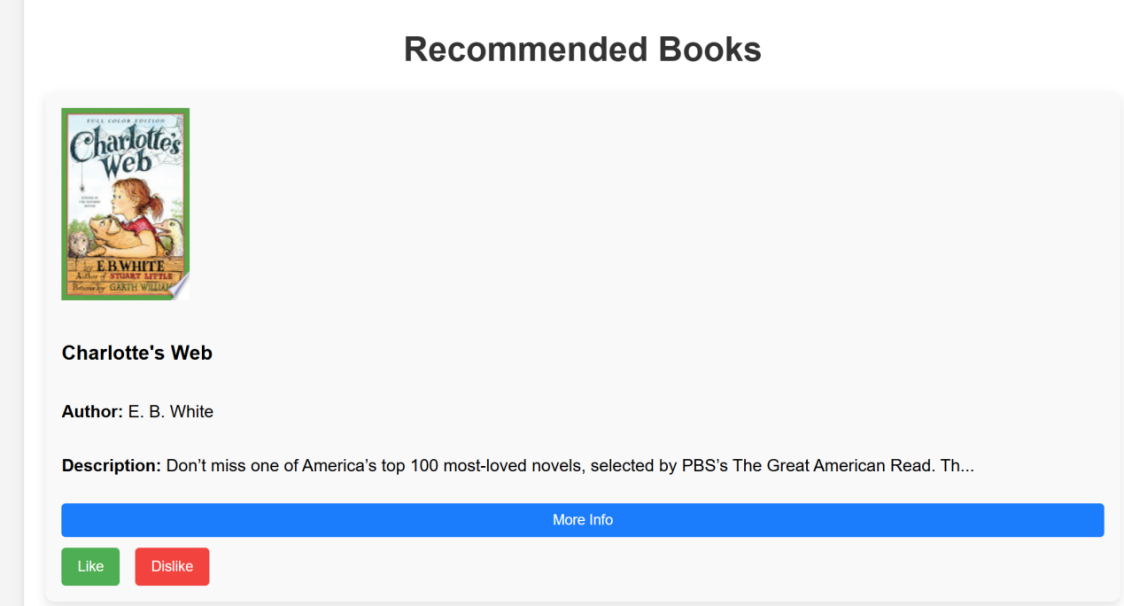
Figure 3. like or dislike page
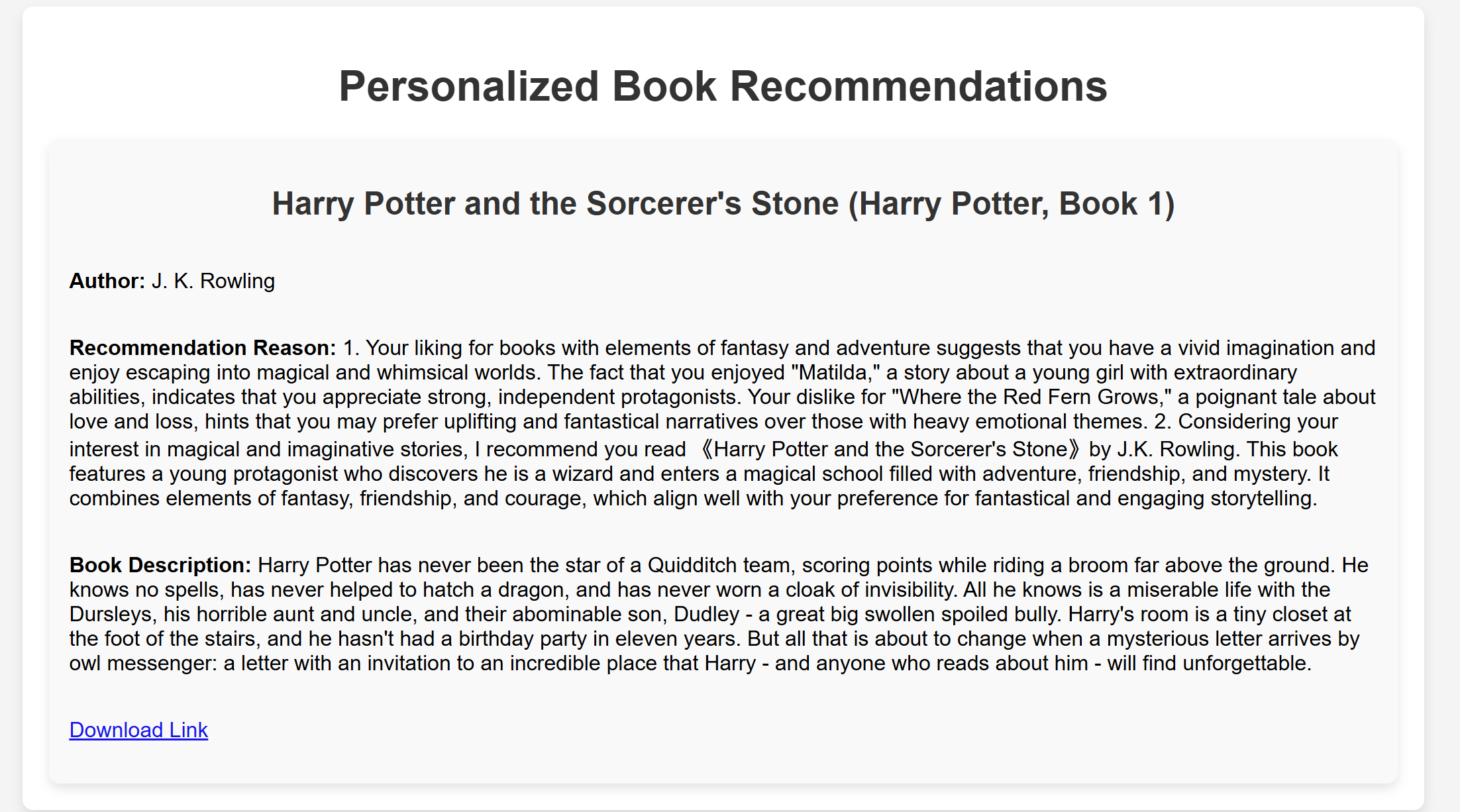 Figure 4. Personalized book recommendation page
Figure 4. Personalized book recommendation page
In the third iteration, we concentrate on the development of a high-fidelity prototype to improve the user experience and system functionality based on the feedback collected from earlier iterations. We try to increase interactive ability and provide more basic but precise information so users can know the recommended books well.
4.1. Research Question
Before further investigation, we elicited a research question: Can the system generate k totally take into account the users’ requirements and then generate a relevant book when the procedure of choosing makes users satisfied.
4.2. Tasks and Procedure
Participants were asked to interact with the high-fidelity prototype of the system. Their tasks included:
5. Selecting their grade level and subjects of interest.
6. Reviewing personalized book recommendations generated by the system based on their inputs.
7. Providing real-time feedback through "Like" and "Dislike" buttons, influencing future recommendations.
8. Exploring additional book details (e.g., author, summary) through the integrated Google Books API.
9. Completing a post-interaction survey to evaluate the system’s usability, accuracy, and effectiveness.
The procedure was designed to simulate a typical student’s interaction with the system, ensuring that feedback was representative of real-world usage.
4.3. Questions
The post-interaction survey asked participants to rate three key areas:
1. Accessibility: How easy was it to navigate and interact with the system?
2. Recommendation Quality: Were the book recommendations accurate and relevant to the participants’ needs? (We set ChatGPT’s response to three points)
3. Overall System Effectiveness: Did the system meet expectations in terms of delivering personalized and useful recommendations?
Participants provided both quantitative ratings on a scale of 1 (very dissatisfied) to 5 (very satisfied).
4.4. Participants
For this iteration, we recruited six participants to test the system. The participants were chosen to represent a range of educational levels: 3 first-year students, two high school students and one middle school student.
This diverse group allowed us to evaluate how well the system could cater to users with varying educational needs and preferences.
4.5. Data Collection
We collected both quantitative and qualitative data to evaluate the system’s performance. We survey some questions and ask participants to evaluate the system through 3 aspects. After that, they can point out some problems remained, then we can polish the system again.
The data collection methods included:
1. Quantitative Ratings:
• Participants rated the system based on three aspects: Accessibility, Recommendation Quality, and System Effectiveness.
• Each criterion was rated on a scale from 1 (very dissatisfied) to 5 (very satisfied). The following table presents the collected ratings.
Table 1. quantitative rating data
Participant | Accessibility | Recommendation Quality | System Effectiveness |
1 | 3 | 5 | 5 |
2 | 5 | 4 | 3 |
3 | 4 | 3 | 4 |
4 | 4 | 4 | 4 |
5 | 5 | 5 | 3 |
6 | 5 | 4 | 5 |
2. Qualitative Feedback:
• Participants provided open-ended feedback regarding their overall experience, which included aspects they found helpful and areas needing improvement. This feedback was crucial in understanding users' expectations and identifying specific pain points.
Overall, the data collected helped provide a comprehensive understanding of the system’s usability, its ability to recommend relevant content, and the effectiveness of the feedback integration mechanism. This data played a key role in guiding further improvements in the system.
4.6. Analysis
4.6.1. Accessibility (Average Score: 4.33)
Accessibility refers to how easily users can navigate and interact with the system without facing unnecessary barriers. In our analysis, accessibility covered aspects such as ease of understanding the user interface, navigating between screens, and the overall intuitiveness of the design.
• Challenges Identified: A few users indicated that certain elements of the interface were not immediately clear. For example, after they click the like or dislike, there will just a button changing into grey without any popups.
• Positive Aspects: On the whole, most users considered the interface to be user-friendly and easy to navigate, with minimal obstacles to using the main functions effectively.
4.6.2. Recommendation Quality (Average Score: 4.17)
The recommendation quality demonstrates whether our books meet their subject needs in the real situation. It reflects how well the recommended books align with students' grade levels, subjects, and specific learning goals.
• Challenges Identified: While some users noted that the recommendations were well-tailored to their study needs, others mentioned that if the suggestions can be interdisciplinary. When they want to improve chemistry and biology at one time, they possibly should read 2 books by our system.
• Positive Aspects: Overall, users appreciated the relevance of most of the recommended books. The system was often able to suggest books that aligned well with their grade and subject interests, which enhanced their satisfaction with the personalized experience.
4.6.3. System Effectiveness (Average Score: 4.00)
The effectiveness of the system, in terms of delivering useful and timely suggestions, received positive responses but indicated areas where improvements were needed.
• Challenges Identified: A few participants felt that the system could provide better support for users who were exploring topics beyond their selected subjects. They noted that the recommendations occasionally missed opportunities to present new and relevant learning materials beyond what was directly requested.
• Positive Aspects: Many participants found the system effective in generating meaningful book suggestions that met their educational requirements. The integration of personalized feedback, such as the "like" and "dislike" buttons, was seen as a valuable feature that allowed them to refine their recommendations over time, contributing to a more interactive and responsive experience.
In conclusion, the results indicate that we have an advantage over the original ChatGPT ai in many fields. The focus on relevant recommendations, easy navigation, and real-time feedback makes it more effective for educational use. Though there is room for improvement, our system proves to be more practical and responsive compared to the general approach of ChatGPT.
4.6.4. Improvements
Based on the feedback from this iteration, we implemented several key improvements:
• Enhanced Explanations for Recommendations: To address user feedback regarding the clarity of recommendations, we refined the system to offer more detailed explanations of why each book was recommended, linking the recommendation directly to the user's selected grade level and subject.
• UI Adjustments: Minor adjustments were made to button placement and the overall layout to ensure smoother navigation and better visibility of key features. Some participants point out the like and dislike can give more suggestions to hint them that they have clicked, such as website popup.
• Optimized Feedback Integration: The feedback mechanism (like/dislike) was optimized to provide more immediate visual feedback, ensuring users could see the impact of their interactions in real-time.
5. Conclusion
In conclusion, the integration of ChatGPT API into book recommendation systems marks a significant advancement in the field of Human-Computer Interaction (HCI), particularly in the context of big data.[6] By leveraging the powerful natural language processing capabilities of ChatGPT, these systems have demonstrated the potential to provide personalized, accurate, and engaging book recommendations. The literature reviewed in this study highlights the various methodologies, approaches, and challenges involved in developing such systems. As the technology continues to evolve, it is expected that ChatGPT-based book recommendation systems will become more sophisticated, user-friendly, and effective.[7] Further research is needed to explore the full potential of ChatGPT in HCI, particularly in enhancing the user experience and interaction with book recommendation systems. Overall, the application of ChatGPT API in book recommendation systems represents a promising direction for future research and development in the field of HCI.
Acknowledgement
Yiyan Zhan and Daiyang Liu contributed equally to this work and should be considered co-first authors.
References
[1]. Wu, S., Huang, Y. and Zhao, C., 2023. ChatGPT for Conversational Recommendation: Refining Recommendations by Reprompting with Feedback. arXiv preprint. Available at: https://arxiv.org/abs/2401.03605.
[2]. Di Palma, D., Santoro, M., Sordoni, A., and Marcolin, G., 2023. Evaluating ChatGPT as a Recommender System: A Rigorous Approach. arXiv preprint. Available at: https://arxiv.org/abs/2309.03613.
[3]. Zhang, Y., Li, Z. and Chen, L., 2023. Uncovering ChatGPT’s Capabilities in Recommender Systems. arXiv preprint. Available at: https://arxiv.org/abs/2305.02182.
[4]. Gao, Y., Lim, C. and Wang, Z., 2023. Is ChatGPT a Good Recommender? A Preliminary Study. arXiv preprint. Available at: https://arxiv.org/abs/2304.10149.
[5]. Rahman, M.S., and Zaman, M., 2023. ChatGPT and Academic Research: A Review and Recommendations. ResearchGate. Available at: https://www.researchgate.net/publication/370096679_ChatGPT_and_Academic_Research_A_Review_and_Recommendations.
[6]. Gabashvili, I.S., 2023. The Impact and Applications of ChatGPT: A Systematic Review of Literature Reviews. arXiv preprint. Available at: https://arxiv.org/abs/2305.18086.
[7]. Montenegro-Rueda, M. and Fernández-Cerero, J., 2023. Impact of the Implementation of ChatGPT in Education: A Systematic Review. Computers, 12(8), pp.153. Available at: https://doi.org/10.3390/computers12080153.
Cite this article
Yu,Z.;Zhan,Y.;Liu,D. (2025). Book Recommendation System. Applied and Computational Engineering,131,132-140.
Data availability
The datasets used and/or analyzed during the current study will be available from the authors upon reasonable request.
Disclaimer/Publisher's Note
The statements, opinions and data contained in all publications are solely those of the individual author(s) and contributor(s) and not of EWA Publishing and/or the editor(s). EWA Publishing and/or the editor(s) disclaim responsibility for any injury to people or property resulting from any ideas, methods, instructions or products referred to in the content.
About volume
Volume title: Proceedings of the 2nd International Conference on Machine Learning and Automation
© 2024 by the author(s). Licensee EWA Publishing, Oxford, UK. This article is an open access article distributed under the terms and
conditions of the Creative Commons Attribution (CC BY) license. Authors who
publish this series agree to the following terms:
1. Authors retain copyright and grant the series right of first publication with the work simultaneously licensed under a Creative Commons
Attribution License that allows others to share the work with an acknowledgment of the work's authorship and initial publication in this
series.
2. Authors are able to enter into separate, additional contractual arrangements for the non-exclusive distribution of the series's published
version of the work (e.g., post it to an institutional repository or publish it in a book), with an acknowledgment of its initial
publication in this series.
3. Authors are permitted and encouraged to post their work online (e.g., in institutional repositories or on their website) prior to and
during the submission process, as it can lead to productive exchanges, as well as earlier and greater citation of published work (See
Open access policy for details).
References
[1]. Wu, S., Huang, Y. and Zhao, C., 2023. ChatGPT for Conversational Recommendation: Refining Recommendations by Reprompting with Feedback. arXiv preprint. Available at: https://arxiv.org/abs/2401.03605.
[2]. Di Palma, D., Santoro, M., Sordoni, A., and Marcolin, G., 2023. Evaluating ChatGPT as a Recommender System: A Rigorous Approach. arXiv preprint. Available at: https://arxiv.org/abs/2309.03613.
[3]. Zhang, Y., Li, Z. and Chen, L., 2023. Uncovering ChatGPT’s Capabilities in Recommender Systems. arXiv preprint. Available at: https://arxiv.org/abs/2305.02182.
[4]. Gao, Y., Lim, C. and Wang, Z., 2023. Is ChatGPT a Good Recommender? A Preliminary Study. arXiv preprint. Available at: https://arxiv.org/abs/2304.10149.
[5]. Rahman, M.S., and Zaman, M., 2023. ChatGPT and Academic Research: A Review and Recommendations. ResearchGate. Available at: https://www.researchgate.net/publication/370096679_ChatGPT_and_Academic_Research_A_Review_and_Recommendations.
[6]. Gabashvili, I.S., 2023. The Impact and Applications of ChatGPT: A Systematic Review of Literature Reviews. arXiv preprint. Available at: https://arxiv.org/abs/2305.18086.
[7]. Montenegro-Rueda, M. and Fernández-Cerero, J., 2023. Impact of the Implementation of ChatGPT in Education: A Systematic Review. Computers, 12(8), pp.153. Available at: https://doi.org/10.3390/computers12080153.





